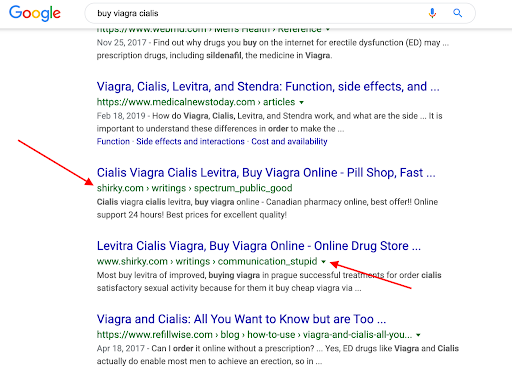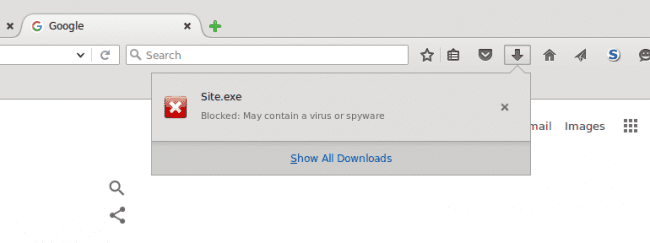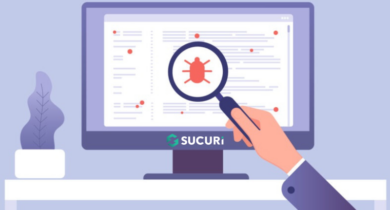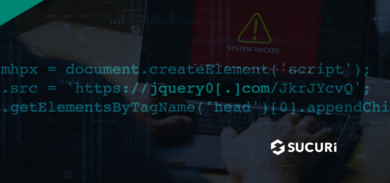Thousands of sites are hacked on a daily basis. In fact, last quarter alone 267,614 site infections were detected with our SiteCheck remote scanner.
One of the main things hackers get by hacking a website is gained access to steal sensitive information or abuse the website’s system resources. As attacks increase and hackers develop more clever techniques, site owners and visitors alike must educate themselves to understand and mitigate risk.
In this post, we’ll go over the kinds of sensitive data hackers can obtain on the web and outline the best methods you can use to protect your site from attack. If you’re using WordPress, there are also additional tips provided in our recent post Why are WordPress Websites Targeted by Hackers?
Contents:
- What is hacking?
- What do hackers do to websites?
- How do hacked sites lead to SEO spam?
- How do hacked sites lead to drive-by-downloads?
- How can I protect a website from hacking?
So, what is hacking anyways?
The simple definition of hacking is the act of compromising a computer, smartphone, website or network. Once a foothold has been established, the hacker will have unauthorized access to data found in the compromised system, device or site.
Hackers (also known as bad actors) are typically characterized as unlawful criminals who roam the web performing malicious acts. But in some cases, “white hat” hackers may even be the good guys — knowledgeable security experts who compromise systems and inform organizations of vulnerabilities in an attempt to stay one step ahead of the bad guys.
It’s also worth noting that hackers can be motivated by a wide range of different reasons. For example, a hacker might be inspired to compromise a system for the pure challenge of it, though most often it’s for money, power, or kudos.
What do hackers do to websites?
An attacker can obtain a wide range of information from a hacked website database — and they can also exploit valuable server resources. There is often a lot of sensitive data available on vulnerable websites, ranging from credit cards to passwords. Hackers can exploit this information by using it for fraud or selling it to other bad actors on the black market. Identity theft in today’s world is no joke and can have huge implications for a website owner — and their traffic.
The types of attacks that can affect a hacked website include:
- Phishing campaigns
- SQL Injections
- Backdoors
- Access Control
- XSS attacks
- Man-in-the-middle-attack (MitM)
- Clickjacking
- Cross-site request forgery (CSRF)
- Session hijacking
- Credit card skimming
- Directory traversal
- Brute Force Attack
- Ransomware
Hacked sites can lead to SEO Spam
The main purpose behind an SEO spam injection is to prop up the hacker’s spam sites for profit and piggyback of a website’s existing rankings and traffic.
SEO spam injections are often used to redirect visitors to their own sites. In terms of traffic, business, and reputation that has a heavy impact on any type of site big or small.

This is just one example of the most common types of website infections that website administrators face.
Hacked sites can lead to drive-by-download attacks
When hackers have the capability of injecting malicious code into a site, they can take advantage of this by deploying malicious file downloads to a client’s operating system without their knowledge. These include some of the following:
- Trojan horses
- Ransomware
- Botnet toolkits
- Droppers
- Man in the Middle (MitM tools)
- Keyloggers
- Data transfer
How can I protect against a hacked website?
We’ve outlined a few tips you can follow the protect your site against hacks and attacks.
1 – Ensure that all logins are secure
Admin panel compromises are easily one of the most common attacks that everyday WordPress websites face. Brute force attacks and compromised admin credentials are two of the most common attack vectors, and can be easily mitigated with a few hardening techniques.
So, how do you create a secure login environment for your website? You can accomplish this by ensuring administrator login panels and credentials aren’t predictable.
For example, don’t use /wp-admin by default or admin as your primary username.
2 – Enable 2FA & CAPTCHA
Another way to harden your website against hackers is to enable 2FA or multi-factor authentication and captcha on your site’s pages. These features will help prevent unauthorized access to your website.
3 – Follow the principle of least privilege
The principle of least privilege is all about having the least amount of privileges for user roles in order to perform required actions. You can apply these privileges by using different roles and only providing access when absolutely necessary. This will help prevent unauthorized users from performing actions that they shouldn’t be able to on your site.
4 – Use strong passwords
The reality is that passwords are often the only thing preventing a hacker from gaining access to your website or server. By using unique and strong passwords for all your accounts, you can significantly reduce the risk of your site getting hacked.
5 – Employ SSL and HTTPS
SSL certificates allow your website to use the HTTPS protocol to securely transfer information to and from your site. It’s especially important for ecommerce websites, but it’s worth noting that search authorities like Google also use it for rankings. So by using SSL you not only secure data while it’s in transit, but also improve your site’s SEO.
6 – Use a web application firewall
A website firewall can filter out malicious traffic before it ever even reaches your site. Keeping up to date with the latest versions of software, themes, and plugins will also help avoid any infections as well.
But if you can’t keep up with updates, a firewall with virtual patching can help mitigate the risk of attackers exploiting known vulnerabilities on your site.
7 – Regularly scan for website malware
Regularly scanning your site for malware and indicators of compromise is really important. You can run remote scans on the client side for free, but you’ll want to scan your site at the server level for backdoors, credit card skimmers, and other malware too.
Conclusion
Depending on a hacker’s intentions or motives, there’s a wide range of options a hacker can use to take advantage of an insecure site. With this in mind, it’s important to take proactive measures to avoid impact to your site’s reputation and traffic. And keep in mind: as a site visitor or consumer, you should become more cautious of the sites you’re accessing in regards to your identity and privacy too.
If you believe you’ve become a victim of a hacked website, don’t hesitate to reach out and get the malware cleaned up as soon as possible. Lingering infections have the potential to lead to cross-contamination of other sites on shared servers, as well as significant impact to search engine rankings and reputation.
Our incident response team is here and provides 24/7 coverage for website malware removal.











